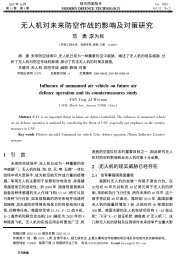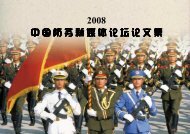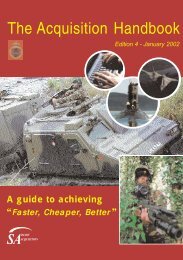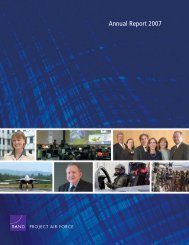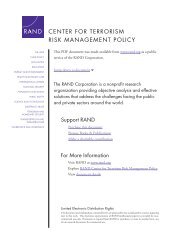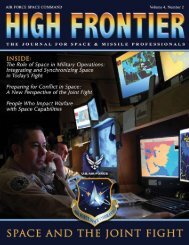Stabilization and Reconstruction Staffing - RAND Corporation
Stabilization and Reconstruction Staffing - RAND Corporation
Stabilization and Reconstruction Staffing - RAND Corporation
You also want an ePaper? Increase the reach of your titles
YUMPU automatically turns print PDFs into web optimized ePapers that Google loves.
72 <strong>Stabilization</strong> <strong>and</strong> <strong>Reconstruction</strong> <strong>Staffing</strong>: Developing U.S. Civilian PersonnelIn other words, there would be multiple staffing problems thatwould need to be managed concurrently: of the SSTR effort <strong>and</strong> ofensuring that contributing domestic offices were able to function aftergiving up staff members for the overseas effort. An approach to dealingwith these conflicting needs will be addressed under the next option.Providing sufficient incentives to cause civilians in the public<strong>and</strong> private sectors to volunteer for deployments. Personnel whoworked for private contractors in Iraq earned much more than didgovernment employees with similar jobs, because they were hired <strong>and</strong>deployed according to market principles, not government pay scales.For example, it was not unusual for the members of a Personal SecurityDetachment (PSD) for a CPA senior executive to have salaries significantlylarger than that of the person they were guarding. 18 This disparityraises the question of what could be done with incentives, althoughit contradicts the previous discussion about the possibility for disparatebenefits causing friction on staffs. The cases for private- <strong>and</strong> publicsectorcivilians are sufficiently different to require different approaches,each presented below.Based on our discussions with executives from the private sectorwho served on the CPA staff <strong>and</strong> those charged with recruiting them,incentives could only reasonably be used for junior- <strong>and</strong> mid-level positions.Executives with private for-profit firms would not be enticed bygovernment salaries or by any benefits that the government would likelybe able to offer, especially for temporary positions for which long-termretirement <strong>and</strong> health insurance coverage is not possible. To paraphrasethe words of one such official who served with the CPA as a senior advisor,he was in effect donating his time while in Iraq, even though hewas receiving the maximum allowable salary for a government seniorexecutive. 19 This same senior executive thought incentives might workfor junior- <strong>and</strong> mid-level personnel, although doing so could providethem with salaries disproportionately larger than those of their publicsectorpeers in a SSTR deployment.18 Based on discussions Kelly had with PSD personnel in Baghdad in 2004.19 Interview with former senior CPA official, March 2005.




